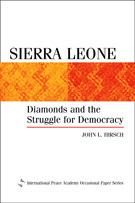John L. Hirsch
Sierra Leone's bitter experience with civil war garnered international attention only after the May 1997 coup, though the conflict between the Revolutionary United Front (RUF) and successive governments had raged for at least a decade against the backdrop of more than three decades of progressive state collapse. John Hirsch traces Sierra Leone's downward spiral, drawing on his first-hand experience as US ambassador in Freetown in 1995-1998.
Hirsch analyzes the historical, social, and economic contexts of the struggle, as well as the impacts of regional and international powers. Topics covered include the exploitation of mineral resources in the country, the involvement of private security forces, and the flawed efforts at peace negotiations.
John L. Hirsch, senior adviser at the International Peace Institute, is also director of the Occidental College United Nations Program.
"Hirsch's short but useful book (complete with a helpful chronology) provides both a concise historical explanation for Sierra Leone's conflict and a series of policy prescriptions for practitioners still grappling with its repercussions.... The most reliable summary to date of international efforts to resolve Sierra Leone's civil war and the most conceptually sophisticated discussion of how events in Sierra Leone relate to wider political processes."—Paul Williams, Journal of Human Rights
"An excellent book that will appeal to scholars and policymakers interested in Sierra Leone's war, the politics of natural resources in conflicts, and the prospects for negotiating settlements of internal wars."—William Reno, Journal of Modern African Studies
"The lessons of Hirsch's analysis are significant and useful."—Elizabeth B. Lamzaki, Journal of International Law and Politics






